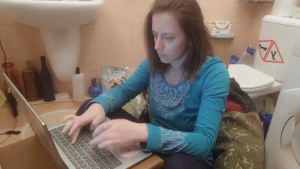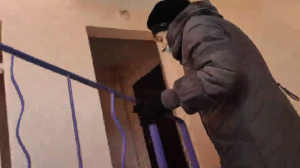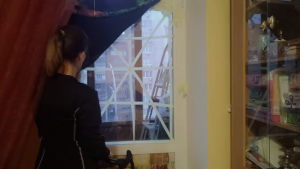The calendar shows the date – it is the 4th of March. However, it does not matter anymore as the days are counted in a different way now. The calendar is useless as the time cannot be identified according to it. The 9th day has dawned – a day that will forever be remembered as the ninth day of the war in Ukraine.
Yulia Snitko, who is eight months pregnant, is expecting a baby in one month. She was once fairly certain that she wanted to bring new life into the world on a beautiful sunny day. However, these dreams and fantasies have since faded into distant memories. Now the passing of time no longer holds any significance. For nine tormenting days, she has been living in an underground bomb shelter, trying to survive and running away from death. She has not seen the sky for nine whole days. The constant bombing and air raid sirens have left her unsettled and she is unable to determine whether it is a night or a day.
It was seven months ago when she found out about her pregnancy. That is when she felt that the most blissful time of her life was about to unfold. The anticipation of a baby was growing day by day as she was counting down the days. However, the clock stopped ticking, when the first Russian bomb fell on Ukraine’s territory. On February 24th Yulia’s world was completely shattered and it would never be the same anymore. Her life was forever split into two parts – before the war and after it…

“I spent the first night of the war in the bunker and slept on hard cardboard boxes. My back was in excruciating pain. Soon my husband and I realized that this war was not going to end in one day, so we tried to clean this place. My neighbor disassembled a sofa and gave us the cushions. Now it’s much more comfortable to sleep here”- she says while showing us the bunker.
This bunker was built during World War II. The cold and the freeze are unbearable here and the walls of this bunker are all very thick and moldy. The electricity lines, like everything else in this bunker, are from the era of General Denikin as they say which means it’s too old. However, unlike the water lines in this bunker, the electricity still flows, bringing light to the darkened days.
The shelter is home to more than 50 residents of the building. They constantly hear alarm sirens, which are also heard across Ukraine.
The sirens are particularly intense for Natalya Vainilovich who resides in a house without shelter. During a recent alarm, Natalya spent several days in a metro station, but unfortunately fell ill and had to return home. She spends most days in her bathroom as it is the only place without windows and she can turn on the lights without the fear of being attacked by Russian missiles.
While the alarm siren sounds behind the walls, Natalya and her boyfriend spend their days in the four square meters of the bathroom. They sleep, eat, and work there… Natalya says that despite the danger they decided to stay in Kyiv, where she was raised and where her ancestor’s house still stands.

“Why should I leave my home when a stranger comes to my country?! I want to be here. I want to help. At the very least, I’d like to gather stories about myself and other residents. This is my prime purpose”- she says.
When the air raid sirens stop, Natalya and her boyfriend go out to buy food and water. She says that only a few grocery stores are open in the city and that even those are running out of food.
“Some stores are open. Only where food is sold. There are long queues at these supermarkets since there isn’t much food. The majority of the food from stores was handed to the Ukrainian military. They should have done so. However, this makes purchasing vegetables in a store impossible. They also ran out of milk products. Eggs are also not available in stores. However, we civilians help each other. For example, in my apartment building, my neighbors share food. Those with cars suggested driving to the stores. We’re incredibly supportive of one another,” Natalya adds.
Natalya looks after her grandma and cat, who reside on the outskirts of Kyiv. And she visits them when it is somewhat safe to do so. On the way, she purchases products for them.
It is quite calm on the 14th day of the war, so she decided to go see her grandmother. She finds only the cat at home and assumes her grandmother is out shopping. As she unpacks her purchases, she realizes that the tap water is running low and heads back out with empty bottles in hopes of finding some to refill.
Natalya met her grandmother at a store after filling up the bottles with water at a secret place about which not a lot of locals knew and there were no queues. Natalya’s grandmother had to spend four hours at a store because the bread needed time to be baked. After Natalya helped her 82-year-old grandmother carry the bags to the 8th floor, she became emotional as the current state of the world was too much for her to bear. Through tears, she expressed her heartbreak at having to live through war the second time.
“I was born during World War II. Why Should my life end during the war? Has history taught us anything?”- she says as she hugs her grandchild.

Natalya Vainilovich then returned home since she needed to be there before curfew. She appeared even heavier than before. Going out on the street and seeing all of this with her own eyes, the agony and tears of loved ones, she says, is extremely painful for her. The sound of alarm sirens started again a few minutes after she got home. Natalya went back into the bathroom, shut the door, and her thoughts returned…
“I sit and think, well, if it’s a bombing, what can I do?” nothing. This could be my last night. Maybe the next bomb will hit my building. Life has changed. It is unusual for me to live in a bathroom. I never thought I’d be recording an interview from here,” she tries not to cry and tells us about her feelings.

Through this ongoing conflict at the front lines, 26-year-old Katerina Bilik plays with her younger brother not far from Natalya’s house. The boy created a Kyiv out of bricks, he is holding a helicopter and flies around the miniature model of Kyiv. He claims that this is how he protects the city from Russians.
Outside the windows, there is a real war taking place. It is exactly 32 days. The front line is 70 kilometers from their home. The sound of bombs being dropped and explosions are heard repeatedly over the alarm sirens here…
“I believe I am more needed here because I take care of the elderly. I bring them food. I am also a volunteer, and I assist the Ukrainian army alongside other volunteers. I know everyone here. I’ve spent my entire life here. How should I move ahead? How can I leave my homeland? What should I do in another country? Neither I nor my family is leaving. I can’t stand the thought of losing our motherland. That’s why I’m still here. I’d rather die at home than on the street or at a foreign country’s border ” Katerina says quietly so her brother doesn’t hear.
Katerina’s friends are fighting on the front line. She claims she is unable to reach them. They are in such a location that even the Red Cross cannot enter to assist them. There is no food or drink available. Katerina’s 22-year-old cousin died while defending the homeland in Luhansk just a few days earlier.
“How can I be good at such a time?” I am aware that I am depressed, but I try not to become anxious. During the war, I also strive to make things easy for my family members. Although we have numerous problems, I don’t want to discuss them because our government is doing all possible to assist us and I don’t want to appear ungrateful. Every day, we spend at least an hour standing in line at the grocery store. Of course, some food products are no longer lucrative, and prices have risen, but I don’t consider this an issue because many people are in far worse shape than my family and I. That’s why I’m thankful for what I have.”

The lives of Ukrainians are divided into two different parts: the period prior to and after the war. Their world was completely normal before the war, some went to kindergarten, some to school, some to work while others remained at home or went elsewhere. However, since February 24th, the lives of Ukrainians have become similar to each other, all of them marked by constant reminders of the war such as sirens, poverty, bombings, fear, courage, cold and so on that repeat every week and every month as though it was a never-ending cycle.
There are many other things that unify the population, but the most frequent is a sense of outrage and a desire to have nothing in common with Russia.
“We will never forget this, and we will never forgive Russians. My native languages were Ukrainian and Russian. Prior to the war, I spoke Russian on a daily basis. My family and I spoke Russian. I was thinking in Russian. I will only speak Ukrainian after that. I don’t want to have anything in common with Russians,” says Yulia Snitko, 8 months pregnant, from a freezing bunker.
The explosions that Natalya, Yulia, and Katerina hear have claimed so many lives including children, pregnant women, the elderly, men and women, soldiers, mothers, fathers, and grandparents. Each one of them has a tale to tell and each story carries a heavy weight.
The stories of the deceased are narrated by mothers, grandmothers, fathers, children, friends, and others, and they are for anyone who is eager to listen. Ukrainians say that they will narrate the stories in all languages, except Russian as they do not have any desire to be associated with them.
Ann Ghudushauri


